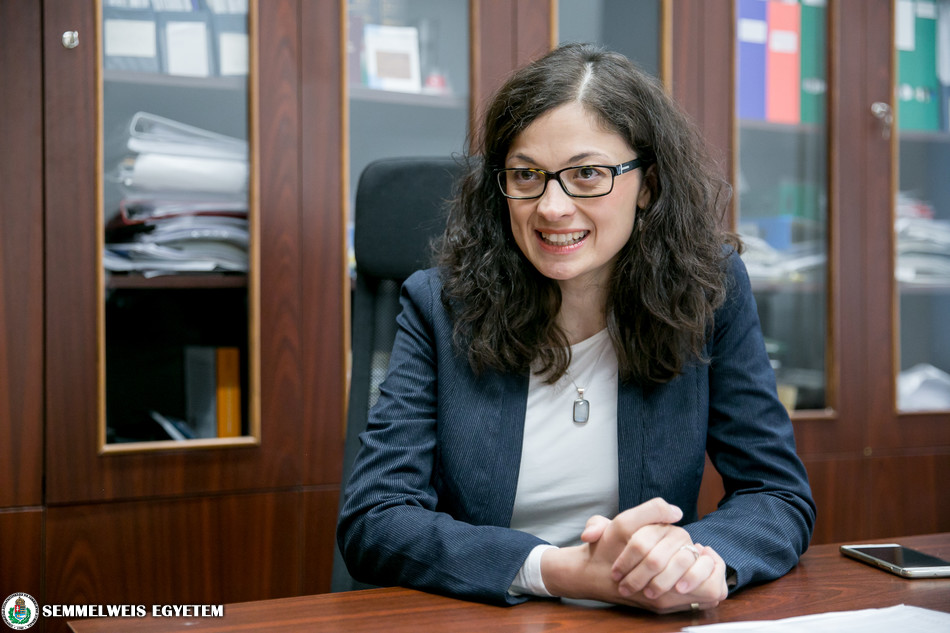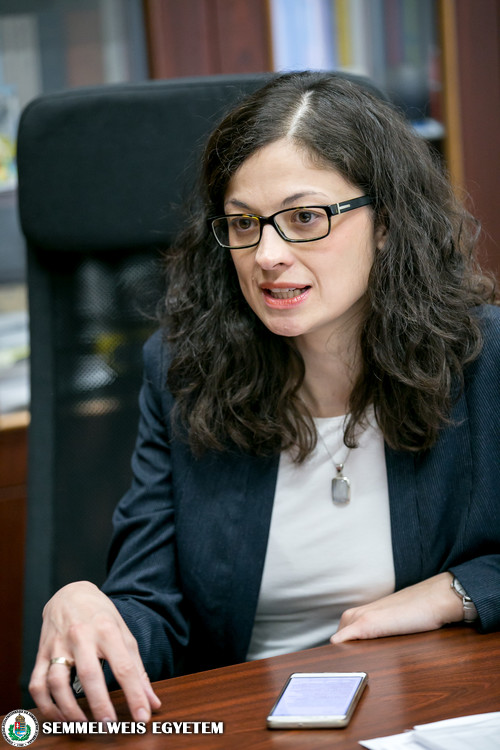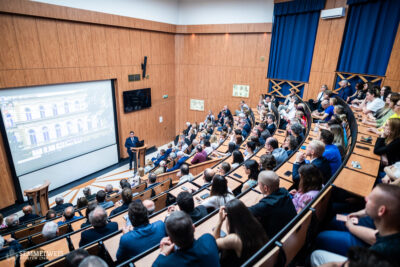The subject of Medical Latin will be modernized, the instruction and courses of languages for specific purposes (LSP) will be updated, and there are plans to include student demonstrators in language training as well, Dr. Katalin Fogarasi-Nuber, the director of the Directorate of Language and Communication said regarding the new goals and tasks of the unit. She also noted that the unit is currently collecting information from the various departments that will help them teach students the courses they really need, and that they are using the latest software applications to aid their research.
 Under the framework of the ongoing curriculum reform, the Directorate of Language and Communication recently proposed the modernization of how medical Latin is taught, which includes the introduction of a new course called Medical Terminology. “The objective here is to provide a basic orientation to students in this area and prepare them for learning through understanding the theoretical courses, such as anatomy, and to familiarize them with the special language of patient documentation, which they will encounter starting from the fourth year,” said Dr. Katalin Fogarasi-Nuber. The director noted that she makes a special point of emphasizing the precision of medical documentation, which happens to also be her field of research. In her doctoral dissertation, she studied cases where errors in documentation, and the different interpretation of certain special terms, led to criminal consequences.
Under the framework of the ongoing curriculum reform, the Directorate of Language and Communication recently proposed the modernization of how medical Latin is taught, which includes the introduction of a new course called Medical Terminology. “The objective here is to provide a basic orientation to students in this area and prepare them for learning through understanding the theoretical courses, such as anatomy, and to familiarize them with the special language of patient documentation, which they will encounter starting from the fourth year,” said Dr. Katalin Fogarasi-Nuber. The director noted that she makes a special point of emphasizing the precision of medical documentation, which happens to also be her field of research. In her doctoral dissertation, she studied cases where errors in documentation, and the different interpretation of certain special terms, led to criminal consequences.
Dr. Katalin Fogarasi-Nuber also spoke about the plans for reforming their activities in foreign language instruction. Uniquely among Hungarian universities, the directorate teaches seven languages for medical, dental medical and pharmaceutical purposes: English, German, French, Spanish, Italian, Russian and Hungarian. Their goal is for students from this September to start learning about the various languages on a beginner level already under the framework of LSP instruction. Courses will also be provided for more advanced students, which in addition to credible professional communication is also the basis for scientific activities and cooperation with international partners. A new LSP course will be launched in September in cooperation with medical staff, which will prepare primarily PhD and TDK students for publishing international scientific articles. They will get to learn, through studying examples of academic articles published in high-impact publications, how to write a successful, high-quality scientific article. The directorate has also recently requested the ability to use demonstrators in the course of their instruction, thus allowing among others upper-year native-speaking international students to also take part in the foreign-language instruction of Hungarians.
 Courses of Hungarian for specific purposes for international students will also be updated, Dr. Fogarasi-Nuber noted, pointing out that the directorate is involved in the instruction of foreign dentistry students studying in the English and German-language programs, as well as students of pharmacy participating in the German-language program. The director said that she and her co-workers are currently gathering information in the field, i.e. from the various departments, on the practical uses of LSP. For example, they are analyzing which key terms are needed during the questioning and informing of patients, so that they can teach foreign students the Hungarian terms that they will actually need during their later work. The directorate is also using various modern research methods – aided by related software programs – to make sure that they use key terms in an authentic, credible way in all seven languages, and they are also compiling relevant terminology databases of these terms.
Courses of Hungarian for specific purposes for international students will also be updated, Dr. Fogarasi-Nuber noted, pointing out that the directorate is involved in the instruction of foreign dentistry students studying in the English and German-language programs, as well as students of pharmacy participating in the German-language program. The director said that she and her co-workers are currently gathering information in the field, i.e. from the various departments, on the practical uses of LSP. For example, they are analyzing which key terms are needed during the questioning and informing of patients, so that they can teach foreign students the Hungarian terms that they will actually need during their later work. The directorate is also using various modern research methods – aided by related software programs – to make sure that they use key terms in an authentic, credible way in all seven languages, and they are also compiling relevant terminology databases of these terms.
The director called attention to the fact that since last December, on behalf of the vice-rector for science and innovation, the directorate provides a free service to all university personnel: they will revise and edit all English-language scientific manuscripts sent to their central email address, and check them for originality as well. The service has proven popular so far, with around 60 publications received in the first four months of the year.
The directorate also provides free trainings for lecturers, clinicians and other health care professionals, which are financed by the university. In March, German LSP courses were started in the Outer Clinical Block at beginner and advanced levels, with the purpose of training the next generation of teachers. The directorate is also open to indications from additional institutes and departments on what level of LSP courses their co-workers looking to participate in the instruction of German-language students would be willing to join.
Dr. Katalin Fogarasi-Nuber has been the head of the Directorate of Language and Communication since August 2018. Previously, she was a senior lecturer at the language department of the medical faculty of the University of Pécs, where among others she coordinated the instruction of medical terminology. Both of her parents are doctors, so even though she was always mainly interested in languages, she developed close relations with the field of health care as well.
Pálma Dobozi
Translation: Tamás Deme
Photo: Attila Kovács – Semmelweis University


